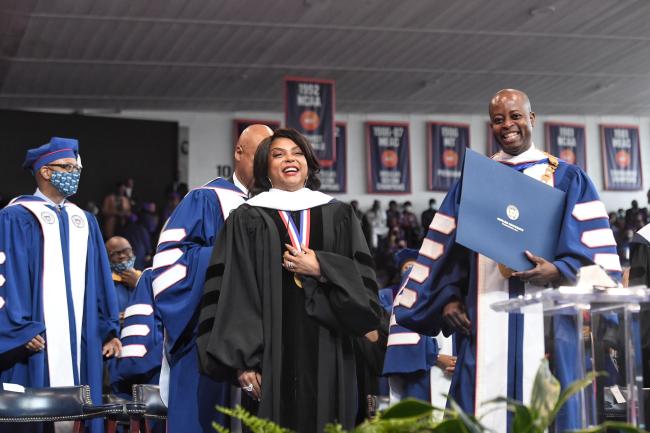WASHINGTON –Taraji P. Henson, award-winning actress and Howard University College of Fine Arts alumna who graduated in 1995 with her baby boy in her hands, returned on May 7 as the commencement speaker. Henson was conferred an honorary Doctorate of Humane Letters, just before delivering remarks.
I would like to take this moment to reintroduce myself: My name is Dr. Taraji Penda Henson, Howard class of 1995.
This year, Howard University awarded 1,953 degrees, including 1,225 undergraduate degrees and 711 graduate degrees. Reinforcing its status as a preeminent research institution, Howard also bestowed 85 research doctorates, including 58 Ph.D. degrees. Graduates represented 43 states and 22 countries.
Howard University President Dr. Wayne A. I. Frederick hailed the graduating class for withstanding a global pandemic, cyberattacks, bomb threats, and a nation-wide U.S. racial justice awakening.
“The challenges you faced over the course of your Howard careers brought out the very best in you,” Dr. Frederick said. “You encountered disruption and responded with determination. You met uncertainty and countered that with resilience. You endured personal loss and struggle and answered with selflessness and service to others.”
Chairman of the Howard University Board of Trustees Lawrence C. Morse also applauded the class for persevering through struggles, and for ultimately earning their diplomas.
“Whether the challenges you faced were natural phenomena or concerted efforts to derail your education, you would not be deterred from your path,” Morse said. “You continued to walk forward at a determined and decisive pace until you reached this celebrated day.”
Alongside Henson, 2022 Howard University honorary degree recipients included renowned public historian Elizabeth Clark-Lewis, Ph.D.; Robert L. Lumpkins, trustee emeritus of the Howard University Board of Trustees and a past vice chairman; Stacey J. Mobley, Esq., distinguished Howard alumnus and chairman emeritus of the Board of Trustees; and Jonelle Procope, president and chief executive of the Apollo Theater.





